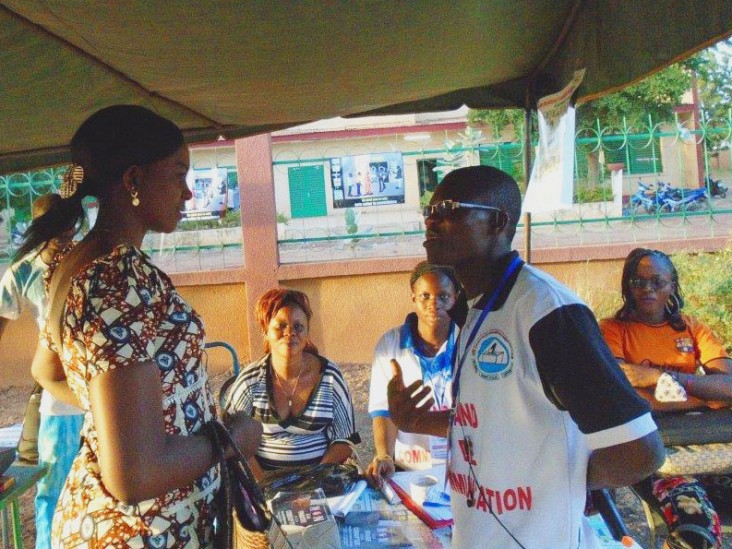
March 2016—As Burkina Faso prepared for its elections in summer and fall 2015, many across the country worried about the potential for unrest. The ban of several candidates and detention of party members by Burkinabe authorities shortly before election season only added to the fear that citizens—in particular, youth—would resort to violence to voice their discontent.
But USAID, together with the National Independent Electoral Commission of Burkina Faso, recognized the potential for youth to promote peace instead of violence. The key was giving young people positive ways to get involved in the electoral process and feel empowered. To do this, USAID and the Electoral Commission organized 14 countrywide “communication booths” in the lead-up to the election.
The booths, which were manned by 28 young people from across Burkina Faso, raised awareness about the critical role youth can play in a credible electoral process. The booth workers, mostly students, conveyed messages about the risks of violent confrontations through loudspeakers, music, posters and radio spots; provided information about the voting process; and explained the SMS system established by the Electoral Commission to identify voters’ polling sites.
Ave Maria Kiemde, a student from the Central Plateau region, was one of the booth workers. Like many young people in Burkina Faso, she had been disengaged from and suspicious of an electoral process that didn’t seem to take youth seriously. By volunteering at a communication booth and educating her peers, she came to understand the value of citizen participation and to feel fully engaged in the political process.
“I always thought that the only time citizens got involved in elections was when they showed up to vote,” she said. “[But] citizens must participate every day by getting involved, being active and working together for a better country.”
Kiemde and other young people involved in raising election awareness became agents for change in a country yearning for democracy. And their voices did not go unnoticed. Traditional and religious authorities as well as international observers praised the Burkinabe youth’s peaceful messaging. Many regions that had experienced conflicts fueled by political parties during former President Blaise Compaoré’s regime witnessed peaceful, youth-led engagement during the 2015 electoral process.
USAID’s communication booths reminded Burkinabe citizens that youth have both the power and responsibility to contribute to the promotion of peaceful and participatory elections. The 2015 elections were an excellent opportunity for youth to take ownership of the country’s electoral process and engage through peaceful means instead of through vandalism and confrontation.
In December, following fair and peaceful elections, Burkina Faso inaugurated a new president and the country successfully completed its first democratic transition.
USAID programs in Burkina Faso promote a civic-minded society with effective and credible electoral processes. Following election support to the country, USAID plans to help build a stronger oversight institution in the new national assembly.
LINKS
Follow @USAIDWestAfrica, on Facebook, on YouTube







Comment
Make a general inquiry or suggest an improvement.